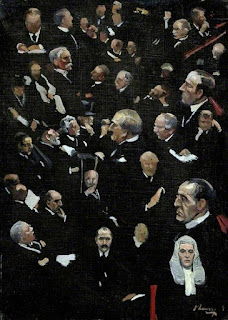The Red Benches of the House of Lords
 |
| Scandal Edgar Bundy (1862-1922) Photo Credit: Grundy Art Gallery [CC BY-NC-SA] |
Supporters of the House of Lords often argue it is a chamber of all the talents, with a breadth and depth of expertise far beyond the Commons. But the Tory group in the Lords, as with the other parties, is heavily dominated by those with political connections. There are almost 100 Conservative ex-MPs, booted into what many speak of as a "retirement home" where they are guaranteed a £300-plus daily allowance for turning up, as well as 34 former special advisors and former party officials.
More than half are politically connected, about 20% are hereditary peers and the remaining group is heavily skewed towards financiers and thinktanks.
There are 184 non-party crossbenchers, many proposed by the House of Lords Appointments Commission, but they make up less than a quarter of the Lords. There are the 25 bishops - despite England and Wales being no longer majority Christian nations.
One Conservative peer, the constitutional expert Philip Norton, has put forward a bill to strengthen the role of the Commission, putting the independent body on a statutory footing, ensuring advice is given before the prime minister asks the king to approve peerages, and asking for recommendations to be assessed on the grounds of merit - not just propriety. It stops short of deep reform or giving the commission powers of veto.
Johnson's resignation honours list brings the potential for further public anger against the Lords. Any attempt by Liz Truss to put forward her own names after the shortest No 10 tenure in history would also no doubt provoke similar concern. Rishi Sunak will have a choice of trying to find a way of blocking one or both of his predecessors' lists - or fuelling Labour arguments that the "indefensible" second chamber has lost legitimacy entirely.
(Rowena Mason, The Guardian, 2022)
Anything that reduces the political nature of the Lords is welcome even though the House of Lords Appointments Commission is an unelected body. A sticking plaster then, rather than a surgical removal! Still, if you pays (donates?) your money you can get to sit on the red benches. But political patronage does not create independence of thought and expertise.
The Lords
 |
Studies made in the House of Lords John Lavery (1856-1941) Photo Credit: The Fitzwilliam Museum [CC BY-NC-ND] |
One in five members of the House of Lords work as consultants or advisors to private businesses while serving in parliament.
An analysis by the Guardian of the register of Lords’ interests shows 169 peers reported they were working as advisors this year, and more than a dozen said they were paid by foreign governments in addition to the expenses they are entitled to as peers.
The consultancies range from a former Conservative MP advising the company of a Romanian businessman facing extradition to a former chief of defence staff who advises the Bahrain government.
The worlds of finance, energy, mining and defence are extensively represented among peers’ clients.
… A labour peer, Lord Levy, has apologised after admitting he failed to register three private interests connecting him to a billionaire Russian businessman.
(The Guardian, 2019)
 |
Studies Made in the House of Lords, John Lavery (1856-1941) Photo Credit: The Fitzwilliam Museum, [CC BY-NC-ND] |
(The Establishment, Owen Jones, pg 3)
*(Church of England) bishops sit in the House of Lords making Britain the only country – other than Iran – to have unelected clerics sitting in the legislature.
(The Establishment, Owen Jones, pg 11)
*How admirable that so many peers wanted to speak in a Lords debate on housebuilding – but roughly half of them had declarable interests.
Labour’s Lady Warwick conceded that she chaired the National Housing Federation. Tory Lord Borwick stated that he was “a house developer with sites in Bicester, Scotland and Sussex”, while his colleague Lord Patten had interests in two housebuilding companies and an insurance firm that has gone into the housing game.
Crossbencher Lord Best said he chaired two housing commissions and was a vice-president of two relevant lobbies. The Earl of Lytton (crossbencher) was “a property professional” and his colleague Lady Watkins “senior independent director at Southern Housing”. The Earl of Caithness had been both a land agent and an estate agent, while Lord Beecham (Lab) was a big knob in the Local Government Association.
Another to speak in the debate was Lord Bethel, a newly arrived hereditary Tory. He did not mention his financial interests in PR firm EQ Communications, whose website boasts of its experience in, er, the housing sector.
(Private Eye, No 14)
Keep up the good work Ian.
*A Labour peer claimed almost £50,000 in attendance and travel expenses covering every single day the House of Lords was sitting last year, despite never speaking or asking questions…
The former trade union general secretary David Brookman was among dozens of members of the Lords who never took part in a single debate, while almost a third of the 800 peers barely participated in parliamentary business over a 12-month period despite costing almost £3.2m in allowances.
…The former Lords speaker Frances D’Souza, a long-term advocate of reform said the findings corroborated “what everyone suspects is going on”, and that a minority of peers risked discrediting the hard work of their colleagues. “There’s clearly a need to reduce numbers,” Lady D’Souza said, adding that the research “clearly shows there are people who are attending the House of Lords who are not contributing, and therefore they are simply redundant”.
Another institution ripe for radical reform.
Comments
Post a Comment